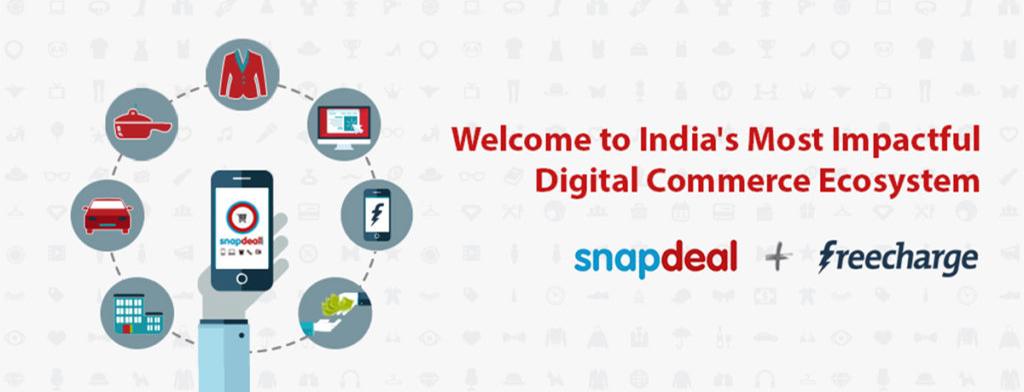
FreeCharge: Incubated Idea to India’s Biggest Online Acquisition
In April 2015, online marketplace, Snapdeal, bought Tandon Group portfolio company, mobile recharge app FreeCharge, further strengthening its position as a long term power player in the consumer internet space in India. FreeCharge is Snapdeal’s biggest acquisition to date and projects to add a substantial volume of transactions occurring through its platform by the end of the fiscal year.
Incubated by Tandon Group
Encouraging entrepreneurship amongst its employees, and mentoring talent for the future is Tandon Group’s passion and in the case of FreeCharge, the Tandon team nurtured the idea since inception. FreeCharge co-founder, Kunal Shah, was running Tandon Group’s business process outsourcing company in Mumbai and he became fascinated with customer behavior after reading a book given to him by U.S. based director Jaideep Tandon – The Psychology of Persuasion by Robert Cialdini.
Kunal then approached the head of Tandon Group, Sandeep Tandon, with an innovative idea built around customer loyalty – a rebate program for the Indian consumer called PaisaBack. It was designed to drive foot traffic to the growing organized retail segment in India. The program was successful but scaling operations was not easy. This drove Kunal to pivot and build a program on the backbone of the rapidly growing mobile phone market in India. This became FreeCharge.
“I knew that over 90% of all Indians using a cellphone had a prepaid plan that constantly needing refilling. I was always a postpaid consumer and never knew that recharges were that big,” said Kunal.
Incubated by Tandon Group, and later funded by leading venture capital firm Sequoia Capital, Kunal and Sandeep began building out a platform to allow for online recharge in 2010, encouraging users to participate by offering coupons of equal value for each recharge.
Launch and Early Struggles
FreeCharge launched its recharging platform on August 15, 2011. Sandeep was able to leverage his extensive network and bring on McDonald’s like the launch partner merchant. The company built up a large customer base very quickly. Before too long they were handling over 10 thousand transactions every day. This early success brought with it some challenges.
“The technology platform was built in a hurry. Our users were experiencing failed transactions as we tried to grow faster,” says Shailendra Singh, a managing director at Sequoia Capital India that served on FreeCharge’s board.
The company was still attracting new users, but it couldn’t grow because it simply didn’t have the technology to handle a higher transaction volume. It spent several months in this stalled state until it rearchitected the whole platform and moved a substantial portion of its operations to Bengaluru to be closer to young, talented engineers.
Scaling for Rapid Growth
Sandeep and Kunal quickly realized the need to bring in the right talent to scale. Freecharge rounded out its executive team bringing on industry veterans to serve in key positions of COO and CEO. Among them, Alok Goel, former COO of RedBus. With the re-engineered platform and Alok at the helm, FreeCharge started to really take off in late 2013. The company began to market more aggressively and achieve wider brand recognition around the country.
In January 2014, FreeCharge launched its mobile app. At first, the app only accounted for 10% of transactions, but it grew exponentially throughout the year and now accounts for over 70% of total volume. After a new round of funding, FreeCharge was preparing a multi-year growth strategy to double or even triple its user base of 20 million people.
It had quickly become India’s most transactive e-commerce site with close to 500,000 transactions a day.
Snapdeal Acquisition
Around the same time as the new investment deals closed, Kunal received a call from Snapdeal CEO, Kunal Bahl. Kunal B. met with Kunal S., Sandeep, and Alok at the Sahara Star Hotel in Mumbai, and the subject of an acquisition came up almost immediately. The company leaders focused on the fit between the two companies.
“The first question that came to our mind was of synergy between the two firms,” says Alok. “We did not want one plus one to be two but 11.”
On the other side of the table, Kunal and Snapdeal were thinking not just about FreeCharge’s current user base, but also its potential to grow and expand into new categories. They viewed it as a critical tool to drive long term user growth and engagement.
While FreeCharge is now part of Snapdeal, it will retain its name, brand identity, and leadership.
To Tandon Group, the acquisition of FreeCharge represents another kind of success: that of vision, incubation, mentoring and fostering next-generation innovation and entrepreneurial spirit within its own ranks.





